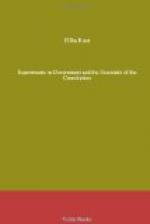In our Federal and State Constitutions we have established the institutions through which these rights are to be secured. We have declared what officers shall make the laws, what officers shall execute them, what officers shall sit in judgment upon claims of right under them. We have prescribed how these officers shall be selected and the tenure by which they shall hold their offices. We have limited them in the powers which they are to exercise, and, where it has been deemed necessary, we have imposed specific duties upon them. The body of rules thus prescribed constitute the governmental institutions of the United States.
When proposals are made to change these institutions there are certain general considerations which should be observed.
The first consideration is that free government is impossible except through prescribed and established governmental institutions, which work out the ends of government through many separate human agents, each doing his part in obedience to law. Popular will cannot execute itself directly except through a mob. Popular will cannot get itself executed through an irresponsible executive, for that is simple autocracy. An executive limited only by the direct expression of popular will cannot be held to responsibility against his will, because, having possession of all the powers of government, he can prevent any true, free, and general expression adverse to himself, and unless he yields voluntarily he can be overturned only by a revolution. The familiar Spanish-American dictatorships are illustrations of this. A dictator once established by what is or is alleged to be public choice never permits an expression of public will which will displace him, and he goes out only through a new revolution because he alone controls the machinery through which he could be displaced peaceably. A system with a plebiscite at one end and Louis Napoleon at the other could not give France free government; and it was only after the humiliation of defeat in a great war and the horrors of the Commune that the French people were able to establish a government that would really execute their will through carefully devised institutions in which they gave their chief executive very little power indeed.
We should, therefore, reject every proposal which involves the idea that the people can rule merely by voting, or merely by voting and having one man or group of men to execute their will.
A second consideration is that in estimating the value of any system of governmental institutions due regard must be had to the true functions of government and to the limitations imposed by nature upon what it is possible for government to accomplish. We all know of course that we cannot abolish all the evils in this world by statute or by the enforcement of statutes, nor can we prevent the inexorable law of nature which decrees that suffering shall follow vice, and all the evil passions and folly of mankind.




